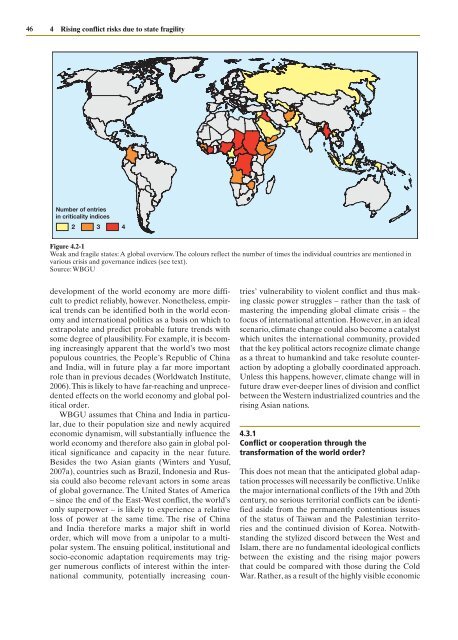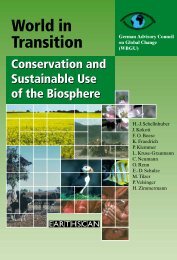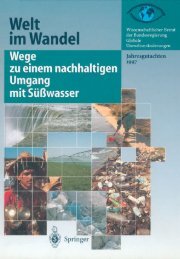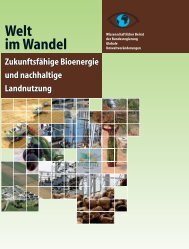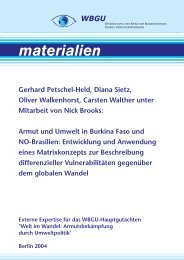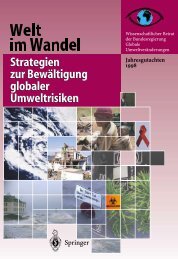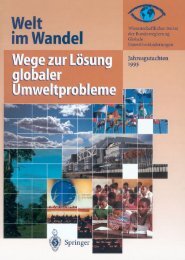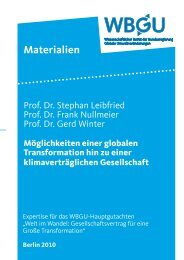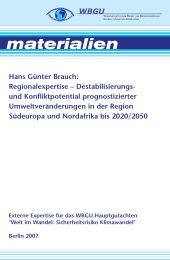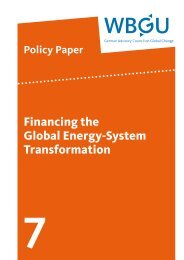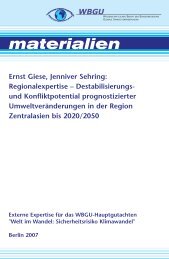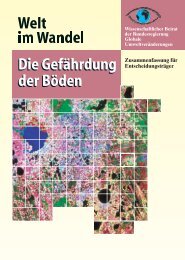World in Transition: Climate Change as a Security Risk - WBGU
World in Transition: Climate Change as a Security Risk - WBGU
World in Transition: Climate Change as a Security Risk - WBGU
You also want an ePaper? Increase the reach of your titles
YUMPU automatically turns print PDFs into web optimized ePapers that Google loves.
46 4 Ris<strong>in</strong>g conflict risks due to state fragility<br />
Number of entries<br />
<strong>in</strong> criticality <strong>in</strong>dices<br />
2 3 4<br />
Figure 4.2-1<br />
Weak and fragile states: A global overview. The colours reflect the number of times the <strong>in</strong>dividual countries are mentioned <strong>in</strong><br />
various crisis and governance <strong>in</strong>dices (see text).<br />
Source: <strong>WBGU</strong><br />
development of the world economy are more difficult<br />
to predict reliably, however. Nonetheless, empirical<br />
trends can be identified both <strong>in</strong> the world economy<br />
and <strong>in</strong>ternational politics <strong>as</strong> a b<strong>as</strong>is on which to<br />
extrapolate and predict probable future trends with<br />
some degree of plausibility. For example, it is becom<strong>in</strong>g<br />
<strong>in</strong>cre<strong>as</strong><strong>in</strong>gly apparent that the world’s two most<br />
populous countries, the People’s Republic of Ch<strong>in</strong>a<br />
and India, will <strong>in</strong> future play a far more important<br />
role than <strong>in</strong> previous decades (<strong>World</strong>watch Institute,<br />
2006). This is likely to have far-reach<strong>in</strong>g and unprecedented<br />
effects on the world economy and global political<br />
order.<br />
<strong>WBGU</strong> <strong>as</strong>sumes that Ch<strong>in</strong>a and India <strong>in</strong> particular,<br />
due to their population size and newly acquired<br />
economic dynamism, will substantially <strong>in</strong>fluence the<br />
world economy and therefore also ga<strong>in</strong> <strong>in</strong> global political<br />
significance and capacity <strong>in</strong> the near future.<br />
Besides the two Asian giants (W<strong>in</strong>ters and Yusuf,<br />
2007a), countries such <strong>as</strong> Brazil, Indonesia and Russia<br />
could also become relevant actors <strong>in</strong> some are<strong>as</strong><br />
of global governance. The United States of America<br />
– s<strong>in</strong>ce the end of the E<strong>as</strong>t-West conflict, the world’s<br />
only superpower – is likely to experience a relative<br />
loss of power at the same time. The rise of Ch<strong>in</strong>a<br />
and India therefore marks a major shift <strong>in</strong> world<br />
order, which will move from a unipolar to a multipolar<br />
system. The ensu<strong>in</strong>g political, <strong>in</strong>stitutional and<br />
socio-economic adaptation requirements may trigger<br />
numerous conflicts of <strong>in</strong>terest with<strong>in</strong> the <strong>in</strong>ternational<br />
community, potentially <strong>in</strong>cre<strong>as</strong><strong>in</strong>g coun-<br />
tries’ vulnerability to violent conflict and thus mak<strong>in</strong>g<br />
cl<strong>as</strong>sic power struggles – rather than the t<strong>as</strong>k of<br />
m<strong>as</strong>ter<strong>in</strong>g the impend<strong>in</strong>g global climate crisis – the<br />
focus of <strong>in</strong>ternational attention. However, <strong>in</strong> an ideal<br />
scenario, climate change could also become a catalyst<br />
which unites the <strong>in</strong>ternational community, provided<br />
that the key political actors recognize climate change<br />
<strong>as</strong> a threat to humank<strong>in</strong>d and take resolute counteraction<br />
by adopt<strong>in</strong>g a globally coord<strong>in</strong>ated approach.<br />
Unless this happens, however, climate change will <strong>in</strong><br />
future draw ever-deeper l<strong>in</strong>es of division and conflict<br />
between the Western <strong>in</strong>dustrialized countries and the<br />
ris<strong>in</strong>g Asian nations.<br />
4.3.1<br />
Conflict or cooperation through the<br />
transformation of the world order?<br />
This does not mean that the anticipated global adaptation<br />
processes will necessarily be conflictive. Unlike<br />
the major <strong>in</strong>ternational conflicts of the 19th and 20th<br />
century, no serious territorial conflicts can be identified<br />
<strong>as</strong>ide from the permanently contentious issues<br />
of the status of Taiwan and the Palest<strong>in</strong>ian territories<br />
and the cont<strong>in</strong>ued division of Korea. Notwithstand<strong>in</strong>g<br />
the stylized discord between the West and<br />
Islam, there are no fundamental ideological conflicts<br />
between the exist<strong>in</strong>g and the ris<strong>in</strong>g major powers<br />
that could be compared with those dur<strong>in</strong>g the Cold<br />
War. Rather, <strong>as</strong> a result of the highly visible economic


